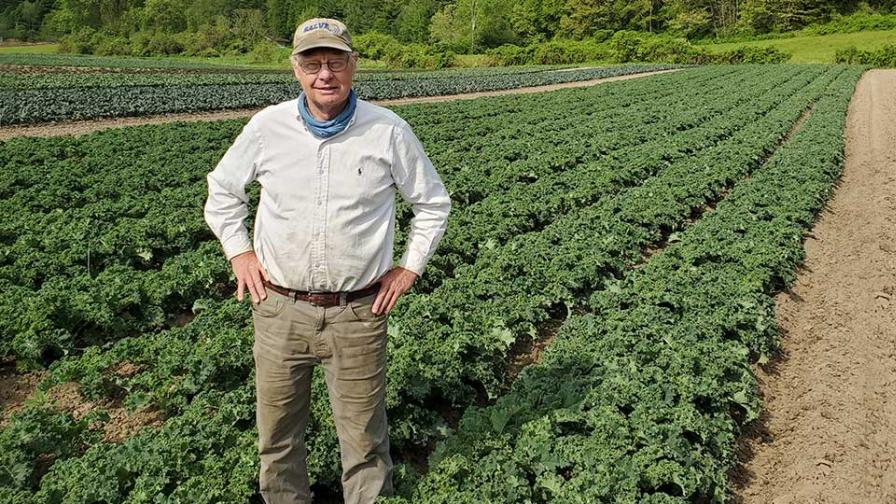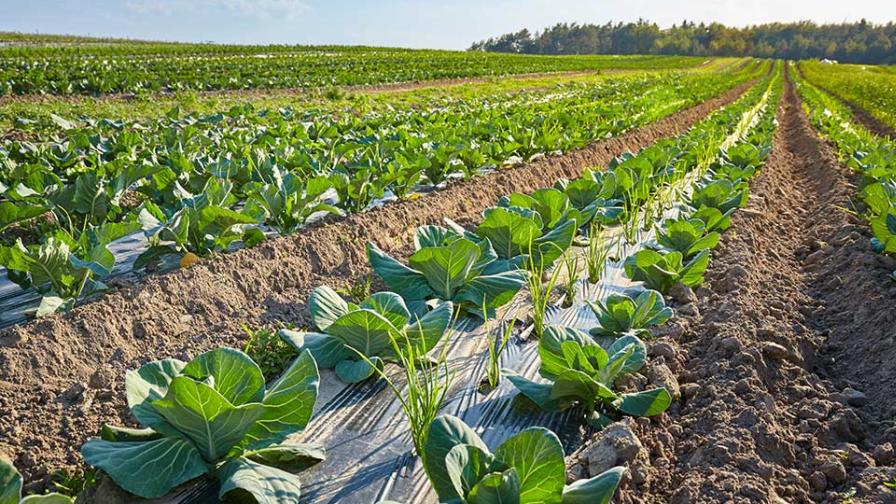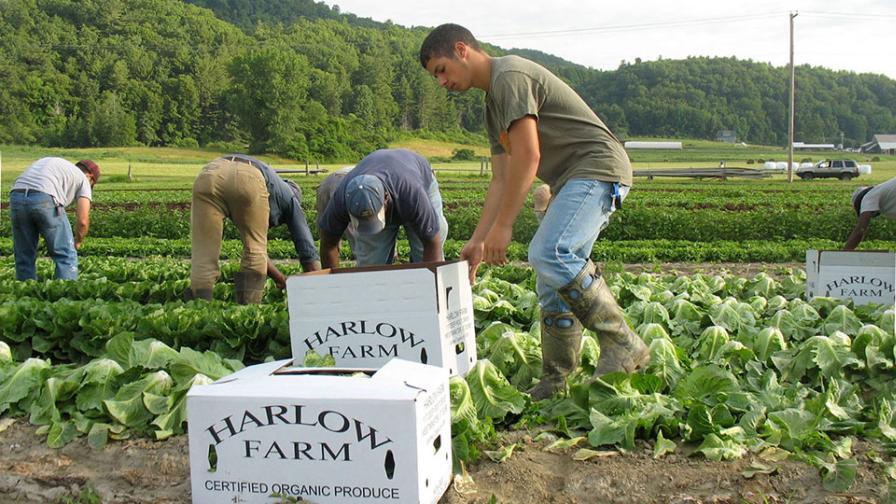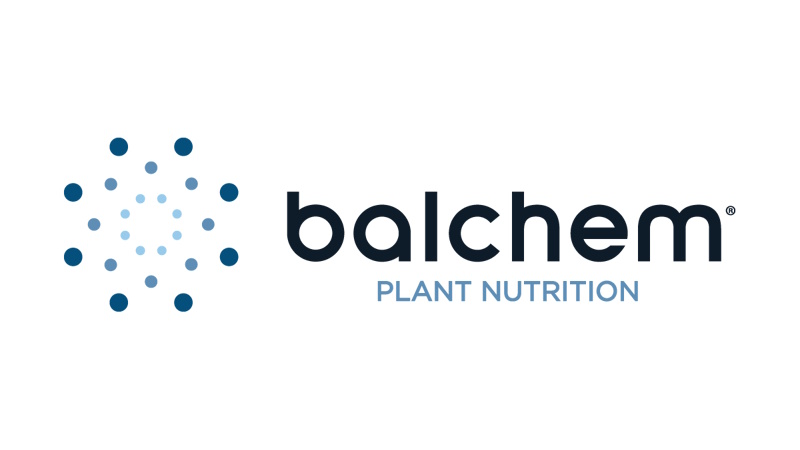How Organic Production Can Be a Balancing Act for Vegetable Growers

Paul Harlow and his team use mechanical cultivation and flame weeding to keep fields free of weeds.
Photo courtesy of Harlow Farms
Many vegetable growers have a love- tolerate relationship with the USDA National Organic Program.
There are a lot of things to love about the certification. First, it means something. Growers must live up to a high bar for their crops to earn certified organic status. The standards back up what organic growers already aim for.
“We use organic growing methods because we believe they are much better for the health of the soil than conventional,” says Paul Harlow, owner of Harlow Farms LLC, a 400-acre organic farm in Vermont. “We see ourselves as stewards of the piece of land we farm and do our best to preserve it for the future of our business as well as future generations.”
But, sometimes those rules contradict sustainable-minded growers’ goals.
“Sometimes organic production allows things that aren’t really as safe as they should be and certainly doesn’t require the farm to be sustainable in the sense it is making the land it’s on better, less polluted, and able to continue production into the future,” says Aaron Nichols, co-owner of Stoneboat Farm in Hillsboro, OR. Stoneboat Farm is not currently certified organic.
Let’s take a look at a few of those challenges and how growers like Harlow and Nichols handle them.
Managing Weeds and Disease
In general, organic methods reduce overall pest pressure.
“We have seen over the years that organic practices such as crop rotation, adding compost, and tilling in cover crops builds organic matter and reduces the need for additional fertilizer. It also reduces pressure from weeds and insect pests,” Harlow says.
Once weeds or diseases break through, however, it can be hard to keep on top of things.
“Overly wet years can be hard because disease is more prevalent, and we can’t use chemical fungicides to control it,” Harlow says. “Weed control is also harder during wet years because timing of weeding is crucial and if we can’t get into the fields, it can quickly get out of hand.”
Farms have an arsenal of techniques and products they’ve developed to handle the outbreaks. And every once in a while, growers find the available control options run counter to their goals to build a healthier environment.
“Sometimes things are disallowed that might actually help reduce waste,” Nichols says. “For a long time, the only decent biodegradable plastic mulch wasn’t allowed due to a dispute with OMRI and the producer.”
And when it comes to fungicides, there just aren’t a lot of choices. That leaves certified growers — and those who want to keep fields in compliance for future official organic production — an unappealing option.
“I try not to apply copper as a fungicide unless we really need to. It’s not good for the soil and ground water, but sometimes it is needed. It would be great if there were better fungicides available for organic,” Harlow adds.
The Plastic Mulch Debate
Plastic mulch is one of the most effective weed control methods in organic growing. No chemicals. Retains moisture in the soil. But it has its issues.
“Yes, it’s organic. But it goes into the landfill. No, it’s not recycled. How is that sustainable?” asks Connie Maxwell of Dragonfly Trace Farms.
Harlow agrees with Maxwell.
“We try not to use plastic mulch. It is labor intensive to install and remove. It also produces a lot of waste.”
Earlier, Nichols mentioned not being able to use biodegradable plastic mulch. Maxwell says that’s because it’s made from cornstarch. Cornstarch uses GMO corn treated with pesticides, she says, so it’s not on the approved organic certification list.

Organic rules allow for plastic mulch, but growers struggle to find a more sustainable version to use.
Another alternative is biodegradable paper.
“Works well, but wind or hail destroys it,” Maxwell says.
The other option is weeding, either manually or with machinery. Automated weeders are so new to the market, they’re costly and not yet in wide distribution.
How Harlow Farm Keeps Weeds at Bay
Harlow Farms does all it can to keep weed populations down before they start.
“Our weed control program focuses on mechanical cultivation. This reduces hand weeding. It has to be done at the right time so that the weeds aren’t too big,” he says.
He also turns to a less common technique.
“We use flame weeding for root crops. This involves running a propane burner over the seed bed right before the plants come up to kill any weeds that are present. It only works well if the weeds are small,” he says.

American Vegetable Grower’s GROW STRONGER initiative brings you positive stories from progressive growers filled with innovative solutions to help you grow a stronger future.
And finally, Harlow’s team finds transplanting mature seedlings helps a lot with weed control.
“We transplant everything except root crops from seedlings started in the greenhouse. This includes leafy greens, cabbage, broccoli, winter squash, and sweet corn. This gives the plants a big head start on weeds,” Harlow says.
All this takes labor, naturally. Without access to chemical herbicides, Harlow Farm crews have to spend a lot more time hand weeding.
“We mitigate the labor issue by participating in the H-2A guestworker program. We have 17 employees who come from Jamaica each season through the program and stay for the season. We still need to hire U.S. workers, but it gives us a core crew to rely on if local labor is hard to find,” Harlow says.
To Certify or Not?
Not all growers using organic methods seek certification. Nichols, for example, is not certified for a variety of reasons.
Mainly, his small farm grows for restaurants and CSAs. His customers trust what he grows without official certification.
“Overall, though, I’m glad [organic certification is] there — if we sold more wholesale, we’d probably certify. I think that we sometimes miss that,” Nichols says.
For those who do sell to broader markets, getting certification makes sense.
“The advantages to being a certified organic grower include market access, and transparency to the public. Most retailers require certification to sell produce as organic and prices are generally higher for organic than conventional,” Harlow says.
“It’s a good thing the word organic means something,” Nichols says. Harlow agrees.
“I think it is a good thing that the organic label is standardized across the country so that consumers can be confident any organic produce they purchase is held up to the same standards,” he says.
All in all, the benefits outweigh the hassles in organic certification.
“The good parts of the regulation (being able to use the word organic and have it mean something) will always come with some difficulties in the regulation. It is the way of humans working together!” Nichols says.

Organic growing generally requires more labor. Harlow Farm uses a mix of American and foreign labor (through the H-2A program).
Photo courtesy of Harlow Farms
At a Glance: Harlow Farms LLC
Founded: 1917. The family has farmed the land for four generations. It switched over to organic in 1977 and has been certified organic since 1985.
Owners: Paul Harlow, Evan Harlow, and Cory Walker. Evan Harlow and Walker came on as part owners in 2019.
Location: Two locations in Westminster, VT; one in Putney, VT. All three farms are along the Connecticut River.
Size: 400 acres.
Crops: Head lettuce, kale, collards, cabbage, broccoli, Swiss chard, carrots, beets, rutabaga, parsnip, turnip, winter squash, and sweet corn.
Customers: Grocery store chains, distributers, on-farm store.










